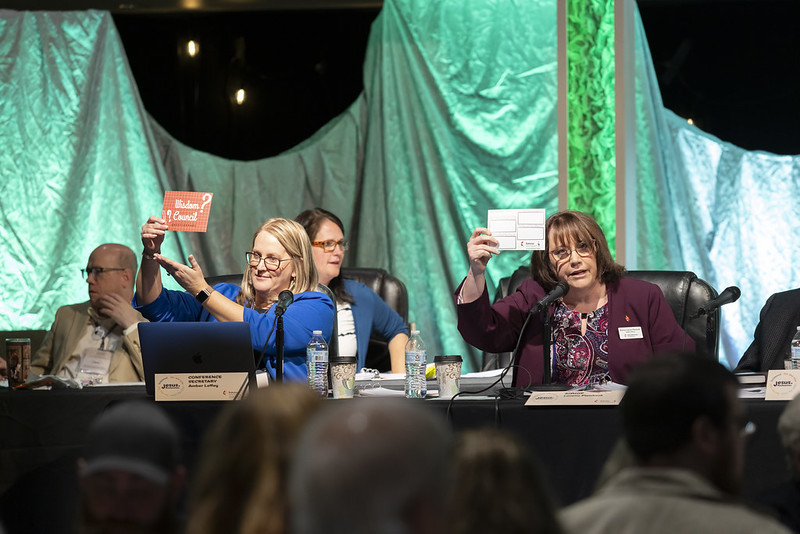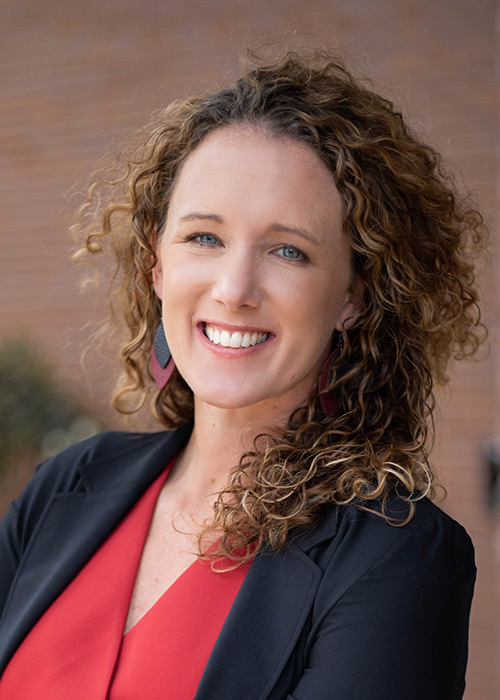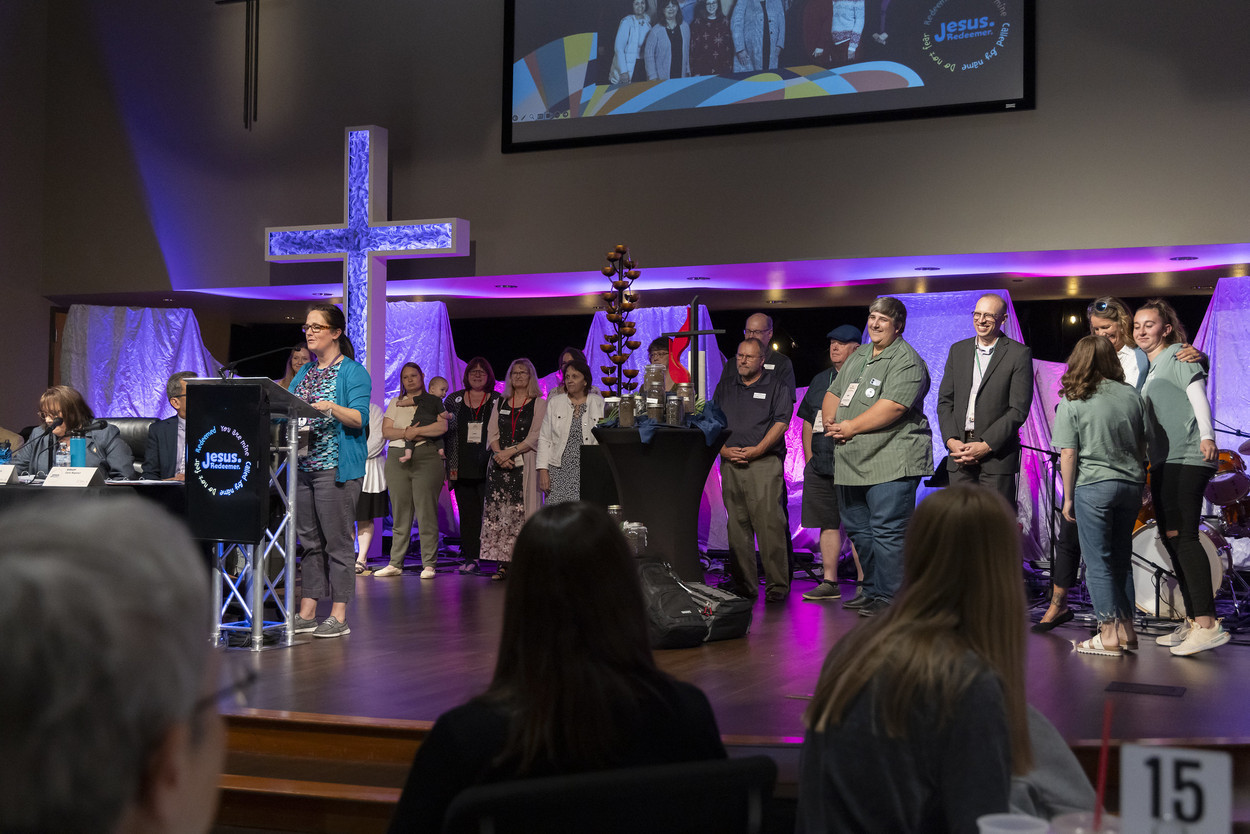
Listening and learning ground work of Wisdom Council

Bishop Lanette and the Wisdom Council invited input from the members of Annual Conference.
During the 2024 Dakotas Annual Conference session in Bismarck, N.D., Bishop Lanette Plambeck introduced the Wisdom Council to the body. Comprised of clergy and laity from across the Conference, Bishop Lanette invited this group of United Methodists to journey alongside of her as the conference begins the discerning work of where God is calling United Methodists in the Dakotas into the future.
“I like to lead in the spirit of collaboration—to surround myself with wisdom—because I don't believe I'm the carrier of it all,” shared Bishop Lanette with those gathered in Bismarck. “I know that there is a time to lead but also there's a time to listen and a time to learn.”
To help guide the discernment process, Bishop Lanette invited Dr. Alisha Vincent, a Dakotas UM lay person, to facilitate the group. Dr. Vincent is an associate professor and leader of the Practical Church Leadership (PCL) program at Dakota Wesleyan University in Mitchell, S.D. She has worked with United Methodist churches across the Dakotas as well as with conference leadership groups for many years. Through her work leading the PCL program, she as engaged with UMC clergy from around the country helping them develop skills to create systems and strategies for effective ministry in their local contexts.
Members of the Wisdom Council come from churches and communities of all sizes across North and South Dakota. They bring a variety of leadership gifts and faith experiences to the work.
“This is not only about their abilities to be strategic thinkers but also a witness of faith—folks who have lived a commitment as United Methodists as seen in their ministry—both as clergy and laity.”
One of those members is Tad Jacobs, a lay member from the United Methodist Church in Flandreau, S.D.
“When I first received the invitation from Bishop Plambeck, I was uncertain if I should accept,” recalled Jacobs, “Joining a team from across the Dakotas Conference to discuss our future seemed like a daunting task especially considering that many of us would not know one another. In addition, as a member of a small rural congregation, I wondered if our concerns would be overshadowed by larger churches.”

Bishop Lanette invited Dr. Alisha Vincent from DWU to facilitate the work of the Wisdom Council.
“All my concerns were rapidly put aside as we came together as a group,” said Jacobs. “Although we come from a broad base of churches, our love for the UMC and the Dakotas Conference is up front at every gathering. You can feel it!”
Rev. Brandon Vetter, southeast district superintendent, also shares enthusiasm for the process thus far. “I’ve enjoyed hearing the wisdom a group of lay and clergy bring from across the Dakotas, dreaming different ways to structure ministry for fruitfulness and impact in a new season,” shared Vetter. “It’s been illuminating for me to see all the different ways the conference supports churches and clergy that I was unaware of.”
“It has been enjoyable working with others across the conference that have the same invested interest in our future,” added Rev. Quaya Ackerman, Wisdom Council member and pastor of Rapid Valley UMC in South Dakota. “Brainstorming ideas and vision casting with others has been rewarding as we look at methods for efficiency and sustainability.”
Listening and learning have been key components to the initial stages of their work.
“I would say that the first half of our work was really just asking a lot of questions and examining some of the systems and structures that are currently working within the conference,” said Dr. Vincent.
To prepare for their time together, Bishop Lanette invited group members to read two books: “Pursuing God’s Will Together” by Ruth Haley Barton and “Turn the Ship Around” by L. David Marquet. Dr. Vincent provided research and data from the Barna group and other sources to understand projections and trends that are happening around the nation that impact church in general. The group also combed through the responses given by the annual conference members to the four questions:
1. What was, or is, the best (or most helpful) service the Dakotas Conference has provided
you are your local church/context and why?
2. What are we doing now that you wouldn't want to lose or see end?
3. What should we consider changing/starting that would assist your local ministry?
4. If resources were abundant, what is your dream for the Dakotas Annual Conference?
Additionally, group members were given a set of questions to survey other individuals who might provide unique insights for their work.
“We did our own survey work to ask questions of people who aren't super connected to the conference but do attend UMC churches as well as people who don't attend UMC churches,” explained Dr. Vincent. “We asked questions about what they know about the conference, what they value, what they care about, and why they do or don't attend church.”
That listening and learning guided the process as the team broke into small groups focusing on leadership development, programming, staffing, and finances.
“We moved into taking that information and considering how it might impact what the conference does and generating ideas that would help, improve, or positively impact the conference and the mission of the church,” said Vincent.
The process has not been without its challenges.
“I think there has been a realization that, unless you talk to people who attend the annual conference every year, they don't really know what services the conference provides,” said Vincent. “It was clear [from our findings and interviews] that there's a disconnect between what's happening in the local church and how they understand and are connected to the values of the conference.”
“We’ve come up with some ideas that are strong in terms of what we were seeing and hearing from the data,” explained Vincent. “But the really emergent theme that showed up was that there needs to be a more in-depth examination of what local churches are looking for before we can design a structure that is going to be as supportive as it can be.”
However, even amidst those challenges, there is hope.
“While we face some challenges with staffing and adjusting to our new financial reality, there is much hope and optimism for the future, that God’s got a future with hope for the Dakotas Conference,” said Vetter. “Everyone has faced our reality not with despair but with a drive to get this done and to move forward together.”

The Extended Cabinet is partnering in the work of discernment with the Wisdom Council.
“One of the things I enjoy most about our group it’s diversity and honesty,” added Jacobs.
It is this diversity and honesty about the dynamics of these liminal times that is an asset to the work. “I appreciate how the Dakotas Wisdom Council recognizes the adaptive challenges before us, requiring creativity, collaboration, and deep faith,” said Bishop Lanette Plambeck. “Their work complements the distinct work of the Extended Cabinet and with the Appointive Cabinet.”
The Wisdom Council recently spent a couple of hours meeting with members of the Dakotas Extended Cabinet to learn from one another and share where each group was sensing what ministries, systems, and strategies needed to be addressed and prioritized.
Both groups emphasized the need for innovation and experimentation – a priority that was echoed in the data that the Wisdom Council reviewed. “There's a movement and a call to innovation in the conference,” shared Dr. Vincent.
Bishop Lanette echoed this sentiment. “The urgency of now compels us to embrace change with courage, trusting that God’s Spirit equips us to lead boldly in a time that demands innovation and hope,” she said.
The next step in the process for the Wisdom Council involves merging some of their findings and ideas with the similar work that has been happening in the Extended Cabinet. The group will then consider how to include representatives from other bodies/committees who have informed perspectives and can assist in the discernment process. Gathering information including audits of current ministries and services as well as local church feedback will be integral to the ongoing process.
“We have a long way to go in this endeavor,” said Jacobs. “My hope is that these are not just items to check off the list but fundamental changes that will help to further our mission to make disciples of Jesus Christ!”
Vetter added, “From this process, I hope the Dakotas UMC fully embraces our DNA, our heritage, as an innovative and experimental movement to share Jesus with all, and to invite everyone into the Wesleyan Way of discipleship, of growing closer to Christ every day.”
“It is my hope and expectation that we will have clear strategies and systems in place as we care for the mission and ministry of our conference and position ourselves for a vibrant future as we live out our commitments to share the good news of Jesus Christ in new and familiar ways,” said Bishop Lanette.
*****
Members of the Wisdom Council include:
Rev. Quaya Ackerman, Rapid Valley UMC, Rapid City, S.D.; Rev. Tiana Bohn, Milnor UMC, Milnor, N.D.; Rev. Thanael Certa-Werner, Abundant Parish UMC, Burke, Gregory, Herrick, S.D.; Robert Green, St. Thomas UMC, St. Thomas, N.D.; Tad Jacobs, Flandreau UMC, Flandreau, S.D.; Rev. Kris Mutzenberger, Northwest District Superintendent and Dean of the Dakotas Cabinet; Terry Nebelsick, Riverview UMC, Huron, S.D.; Mary Lee Nielson, Epworth UMC, Valley City, N.D.; Abi Van Regenmorter, DeSmet UMC, De Smet, S.D.; Karl Rockeman, Dickinson UMC and Conference Co-Lay Leader, Dickinson, N.D.; Rev. Brandon Vetter, Southeast District Superintendent; Rev. Travis Voeltz, First UMC, Jamestown, N.D.; and Richard Wahlstrom, Canyon Lake UMC, Rapid City, S.D.